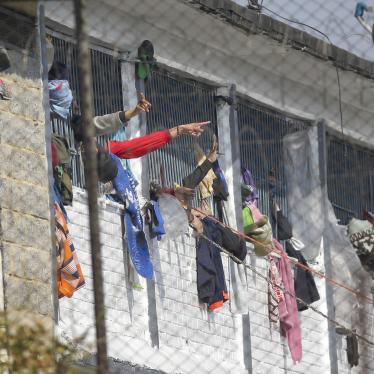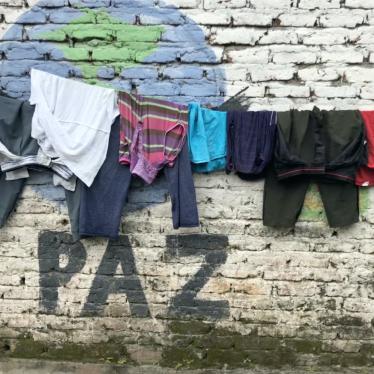Even before her 15-month-old daughter, Yamilet, died of malnutrition, María Clara Palmar Fernandez would sometimes have days when she could not provide any food for her children. “I’d hug them and cry because I could only give them water,” she told us as we sat in her tarp-lined shelter in an indigenous Wayuu community in La Guajira, a state in northeastern Colombia.
The past decade has been the warmest in recorded history. Governments around the world have been reluctant to implement policies to effectively slow climate change, preferring to view its impacts as part of an abstract, distant future. But, for communities such as the Wayuu, the consequences of climate change have already arrived — and their children are bearing the cost.
For centuries, the Wayuu adapted to survive in arid La Guajira by planting crops fit to the region’s unique ecosystem. Seasonal rains have both practical and cultural significance for the Wayuu, representing fertility and marking the passage of time. They replenished parched aquifers, sustained animals and signaled when to plant crops such as beans, corn, melon and tomatoes.
But over the past decade, those seasonal rains have become even less frequent. Water sources have shrunk, and withering crops and dwindling livestock have followed. Prolonged droughts and rising temperatures in recent years have disrupted long-standing Wayuu planting practices and left the land with the largest amount of desertification in the country.
Rainfall in La Guajira has reached historic lows since 2012. In some of those years, residents told us, it did not rain at all. These droughts have been attributed in part to repeated El Niño events, which have increased in frequency due to climate change. In 2020, La Guajira has had record high temperatures.
Wayuu farmers are no longer self-sufficient. They have to buy vegetables, fruit, meat and milk they once produced themselves. Families have been reducing portion sizes, skipping meals and relying on less-nutritious foods.
A traditional Wayuu authority, Daniel Epieyu, told us how his community, deep in the La Guajira desert, copes with this new reality. “Our children eat maybe once a day, in the form of chicha,” he told us, referring to a drink made of boiled corn. “If there isn’t any, they’ll pass the day not eating.”
Climate change in La Guajira compounds serious failures of governance — including extremely poor access to basic services and limited government efforts to root out local corruption — that have triggered a malnutrition crisis.
Like the vast majority of Wayuu communities, Epieyu’s community does not have access to clean water and relies on dirty, possibly contaminated sources. Many Wayuu people travel hours by foot, bicycle or donkey to get water from often poorly maintained wells or jagüeyes, natural aquifers that are entirely rain-dependent. Without clean, ample water, hygiene suffers, bringing diarrheal diseases — which are disproportionately high in La Guajira.
Malnutrition is one of the largest adverse health impacts of climate change around the globe, especially for children, according to the World Health Organization. In La Guajira, children die of malnutrition at a rate nearly six times the national average and the state leads the country in childhood mortality due to malnutrition. While death rates for children younger than 5 have in recent years decreased globally, including in Colombia, the rate has consistently increased in La Guajira. Meanwhile, many Wayuu children who do survive suffer from chronic malnutrition, which compromises their health and development into adulthood.
So far, government efforts to address the crisis — by creating mostly temporary water points and establishing food programs for children — have achieved limited results. Wells installed by the government often are contaminated and lack maintenance, residents told us. Food and health programs have faced serious budgetary constraints.
Without significant government action, the problem of malnutrition will only worsen as the climate crisis intensifies. By the end of the century, scientists project that average temperatures in La Guajira will be 4.14 degrees Fahrenheit higher, while rainfall will be 30 to 40 percent lower.
The government has failed to ensure the Wayuu’s right to an adequate standard of living, including their rights to accessible, affordable and safe water, nutritious food and other essentials for a life with dignity. To prevent deaths such as Yamilet’s, Colombia should ensure that communities such as the Wayuu, heavily impacted by climate change, are able to adapt to the harms that droughts and warming will cause, and secure their rights to water, food and shelter. The lives of many children depend on it.









